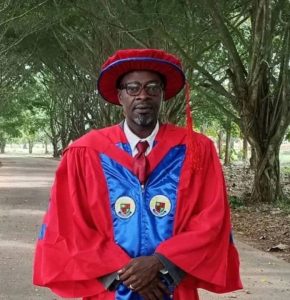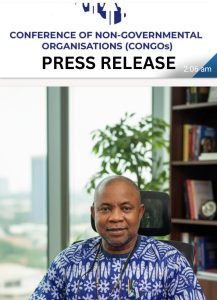
When Senator Monday Okpebholo traversed the length and breadth of Edo State during his campaign trail, he made a clear and resounding promise, to fix the broken foundations of education by employing at least 5,000 teachers and restoring dignity to the teaching profession. To some, it sounded like another campaign soundbite, an aspirational pledge that might never leave the podium. But today, that promise has not only been fulfilled, it has been surpassed, and in a manner that speaks volumes about the governor’s sincerity, discipline, and sense of purpose.
In a country where political promises are often discarded the moment the oath of office is taken, Governor Okpebholo is proving that words still mean something. He has demonstrated that governance can be about impact rather than impression, about substance rather than show. His deliberate action to employ and regularize thousands of teachers across Edo State marks one of the most significant interventions in the education sector in recent memory, not only for what it accomplishes, but for what it represents.
GOV OKPEBHOLO: BECAUSE I AM INVOLVED
For years, Edo teachers lived under a shadow of uncertainty. Many were employed as ad hoc staff, their status undefined, their future unguaranteed. They worked diligently, often under harsh conditions, without clarity on whether they were truly part of the civil service or just political placeholders. Their situation was further compounded by a system that used them as pawns during election seasons, a cycle of manipulation that left them vulnerable and disillusioned.
Governor Okpebholo came into office determined to end that era of exploitation. Rather than treating teachers as tools of political convenience, he has chosen to treat them as the backbone of the state’s human capital development. His decision to absorb these 5000 teachers fully into the Edo State Civil Service and to issue them formal employment letters is more than an administrative exercise; it is an act of justice. It corrects a long-standing wrong and restores dignity to a profession that forms the moral and intellectual fabric of the society.
Edo State Polytechnic Usen
This commitment has shown that his remarks on World Teachers’ Day, a day when many leaders are content to deliver hollow speeches filled with praises and platitudes, was inspired by honesty and sincerity of purpose. Governor Okpebholo did not come with mere words; he came with action. Instead of empty promises, he gave teachers what they had been denied for years, the assurance of job security, recognition, and respect. In doing so, he redefined what leadership should look like: responsive, practical, and compassionate.
The governor’s initiative has breathed new life into the state’s education system. Across primary and secondary schools in urban and rural areas alike, there is a renewed sense of purpose. Classrooms that were once underpopulated due to a shortage of teachers now hum with activity. Students who previously went days without certain subjects now enjoy consistent lessons. Parents, too, are beginning to regain confidence in the public education system. These are the unseen but far-reaching consequences of a government that understands that education is the heartbeat of development.
Former LGA Boss Chairs Edo Poly Governing Council
Beyond the immediate benefits, Okpebholo’s intervention holds deep symbolic significance. It reflects a government that values the role of teachers not merely as employees but as partners in shaping the state’s destiny. It acknowledges that no society can rise above the quality of its teachers, and that when teachers are neglected, the very foundation of that society begins to crumble.
By restoring stability and structure to the profession, the governor has also reignited passion among teachers. For years, many educators in Edo were forced to work without motivation, unsure if their sacrifices were recognized or if their future was secure. Today, they can walk into classrooms with renewed pride, knowing that their government sees them, values them, and stands behind them. That sense of assurance will inevitably translate into better performance, greater commitment, and improved educational outcomes for the state.
Okpebholo believes in Courage, Capacity says Edo Poly Rector
In a broader sense, the governor’s decision has ripple effects that extend far beyond the education sector. It reflects his understanding of governance as a covenant with the people, a commitment to restore order, fairness, and accountability. His fulfillment of this particular campaign promise reinforces the credibility of his administration and strengthens public trust in government. Edo people are beginning to see a leader who does not just talk about progress but delivers it.
The significance of this achievement becomes even clearer when viewed against the backdrop of the past. Under the previous administration, teachers were left in administrative limbo, their employment subject to shifting policies and unclear directives. Some served for years without confirmation; others were used as temporary staff to satisfy political or bureaucratic agendas. That inconsistency not only demoralized the workforce but also disrupted the quality of education across the state.
Option: Governor Okpebholo: Much Ado About Nothing
Governor Okpebholo’s approach, in contrast, is systematic and humane. By ensuring that these teachers are formally absorbed and their status regularized, he has institutionalized fairness and given structure to a system long defined by uncertainty. This move will also help in accurate manpower planning, ensuring that teacher distribution across local government areas aligns with actual needs rather than political convenience.
For the students, this development means continuity, the assurance that their education will not be interrupted by sudden policy reversals or teacher shortages. For the teachers, it means dignity, stability, and a clear career path. For the state, it represents a long-term investment in human capital, the most critical driver of economic growth and social progress.
It is also worth noting that this achievement did not occur in isolation. It is part of a broader effort by the Okpebholo administration to rebuild Edo’s social infrastructure and restore trust in public institutions. From education to healthcare, from civil service reform to rural development, the governor has shown an uncommon commitment to creating systems that work and delivering governance that touches lives.
At the heart of this philosophy is a deep empathy for the ordinary Edo citizen, the teacher who wakes before dawn to shape young minds; the student who dreams of a better future through learning; the parent who hopes for a government that truly cares. Governor Okpebholo’s policies are designed with these people in mind. They are anchored on a belief that progress is meaningful only when it uplifts the people at the base of society.
It is therefore no surprise that teachers across the state have described his actions as unprecedented. Many of them, who had long resigned themselves to fate, now speak of renewed faith in government. Some have called it a rebirth of the teaching profession in Edo State. Indeed, it is difficult to recall a recent administration that has matched this level of practical commitment to the welfare of teachers in such a short time.
But beyond the accolades, the true test of leadership is sustainability. Governor Okpebholo’s approach suggests that he understands this. By embedding his reforms within institutional frameworks, he is ensuring that the progress achieved today will not be reversed tomorrow. His administration is setting a new standard, one where policies are not person-dependent but system-driven; where governance outlives political tenure.
In less than a year, Governor Okpebholo has achieved what others struggled to realize in nearly a decade. He has restored confidence, rekindled hope, and rewritten the narrative of what it means to govern with integrity. For teachers who once felt abandoned, this is a moment of vindication. For the students of Edo State, it is a gateway to a brighter future. And for the state itself, it is a bold statement that progress is possible when leadership is anchored on truth and compassion.
Governor Monday Okpebholo has shown that good governance is not about noise or flamboyance; it is about quiet, consistent delivery. He has given Edo teachers more than employment, he has given them identity, belonging, and pride. And in doing so, he has given Edo State something even greater: a future built on the solid foundation of knowledge, sincerity, and human dignity.
In the final analysis, the governor’s fulfillment of his promise to the teaching community stands as one of the most defining legacies of his early days in office. It is a reminder that when leaders lead with empathy and conviction, progress is not an aspiration. It becomes a reality.
Edo Teachers, Hakuna Matata! Your reward on earth starts now!
Fred Itua is the Chief Press Secretary to Governor Monday Okpebholo of Edo State.






